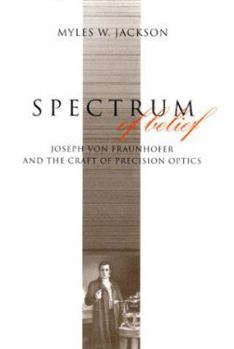Spectrum of Belief: Joseph Von Fraunhofer and the Craft of Precision Optics
(Part of the Transformations: Studies in the History of Science and Technology Series)
Select Format
Select Condition 
Book Overview
In the nineteenth century, scientific practice underwent a dramatic transformation from personal endeavor to business enterprise. In Spectrum of Belief , Myles Jackson explores this transformation through a sociocultural history of the rise of precision optics in Germany. He uses the career of the optician Joseph von Fraunhofer (1787-1826) to probe the relationship between science and society, and between artisans and experimental natural philosophers, during this important transition. Fraunhofer came from a long line of glassmakers. Orphaned at age eleven, the young apprentice moved in with his master, the court decorative glass cutter. At age nineteen, bored with his work and angered by his master's refusal to allow him to study optical theory, Fraunhofer took a position at the Optical Institute assisting in the manufacture of achromatic lenses. Within ten years he was producing the world's finest achromatic lenses and prisms. Housed in an old Benedictine monastery, Fraunhofer's laboratory mirrored the labor of the monks. Because of his secrecy (after his death, even those who had worked most closely with him could not achieve his success), British experimental natural philosophers were unable to reproduce his work. This secrecy, while guaranteeing his institute's monopoly, thwarted Fraunhofer's attempts to gain credibility within the scientific community, which looked down on artisanal work and its clandestine practices as an affront. The response to the ensuing rise of German optical technology sheds light on crucial social, economic, and political issues of the period, such as mechanization, patent law reform, the role of skills in both physics and society, the rise of Mechanics' Institutes, and scientific patronage. After his death, Fraunhofer's example was used in the newly united Germany to argue for the merging of scientific research and technological innovation with industrial and state support.
Format:Hardcover
Language:English
ISBN:0262100843
ISBN13:9780262100847
Release Date:September 2000
Publisher:MIT Press
Length:296 Pages
Weight:1.25 lbs.
Dimensions:0.9" x 6.3" x 9.2"
Age Range:18 years and up
Grade Range:Postsecondary and higher
Customer Reviews
0 rating





